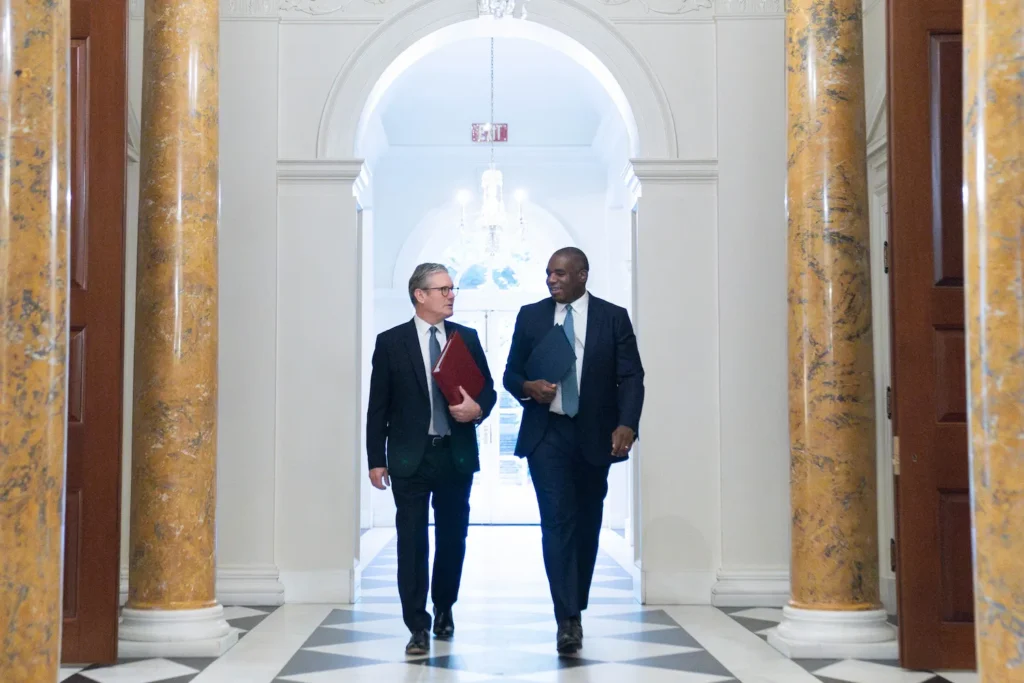Moscow warns doing so could pull NATO into war with Russia.
‘At War’ With NATO
British Prime Minister Keir Starmer and U.S. President Joe Biden appear close to allowing Ukraine to use Western-supplied long-range weapons systems to target military sites deeper inside Russian territory, as long as those weapons aren’t U.S.-provided. European officials said this would likely include British Storm Shadow missiles and France’s similar SCALP-EG weapons but not U.S. Army Tactical Missile Systems.
The two leaders met at the White House on Friday to discuss next steps to better support Ukraine. “From day one, as you heard me say, we have adjusted and adapted as needs have changed, as the battlefield has changed, and I have no doubt that we’ll continue to do that as this evolves,” U.S. Secretary of State Antony Blinken said ahead of the meeting on Wednesday.
Russian President Vladimir Putin, however, warned on Thursday that NATO would find itself “at war” with Moscow if Ukraine is allowed to use these weapons to strike inside Russia. This would “change … the very nature of the conflict” and force the Kremlin to take “appropriate decisions” based on perceived new threats, Putin said. He did not specify what those actions might entail.
Already, analysts have reported Russian forces moving some of their assets, including launch points for glide bombers, out of these missiles’ range. And on Friday, Russia’s Federal Security Service (FSB) revoked the accreditations of six British diplomats in Moscow for alleged spying and sabotage work. London called the accusations “completely baseless” and argued that they were retribution for the United Kingdom expelling Russia’s defense attaché as well as removing some Russian properties’ diplomatic status in May.
Ukrainian President Volodymyr Zelensky has repeatedly urged Kyiv’s Western allies to lift weapons restrictions to help relieve pressure on the front lines in Ukraine’s eastern Donetsk region. On Wednesday, British Foreign Secretary David Lammy suggested that new evidence of Iran sending ballistic missiles to Moscow has changed the strategic thinking in London and Washington on this issue.
The U.S. Treasury Department accused Tehran and Moscow on Tuesday of having signed a contract late last year for the supply of “hundreds” of missiles to Russia. And in May 2023, Zelensky said Iran has supplied more than 1,000 Shahed drones to Moscow since Russia’s full-scale invasion of Ukraine in February 2022.
Iranian missile deliveries are a “significant and dangerous escalation,” Lammy said. He called Putin the “escalator” of the situation; warned of a “new axis of Russia, Iran, and North Korea”; and urged China not to become involved. According to a Reuters report on Friday, Moscow produced more than 2,500 Garpiya-A1 long-range attack drones using Chinese engines and parts from July 2023 to July 2024—some of which have been used against Ukraine. Beijing maintains that it has an impartial stance on the war.
What We’re Following
Uranium production. North Korea released images on Friday of centrifuges at a banned uranium enrichment site that produce fuel for nuclear weapons. President Kim Jong Un called for more weapons-grade material to boost Pyongyang’s nuclear weapons arsenal while at the facility. Increasing production is vital for “self-defense and the capability for a preemptive attack” from the United States and its allies, Kim said.
South Korea condemned North Korea’s nuclear developments, saying they violate several United Nations Security Council resolutions. “Any nuclear threat or provocation by North Korea will be met with an overwhelming and strong response from our government and military, based on the solid extended deterrence of the South Korea-U.S. alliance,” the South Korean Unification Ministry said on Friday.
The White House declined to comment directly on the North Korean images. “I would simply say that we continue to monitor North Korean progression, both in their open nuclear ambitions as well as their ballistic missile technology and program,” White House national security spokesperson John Kirby told reporters.
New retirement timeline. China announced on Friday that it will raise the retirement age beginning next year for the first time since the 1950s. Over the next 15 years, the retirement age for men will increase from age 60 to age 63, and the retirement age for women will increase from age 50 for blue-collar jobs and 55 for white-collar jobs to ages 55 and 58, respectively.
The surprise (and largely unpopular) announcement aims to address China’s declining population and aging workforce; Beijing has one of the youngest retirement age policies in the world, and the Chinese Academy of Social Sciences has estimated that the country’s public pension fund will run out of money by 2035. In that same year, China is expected to have around 400 million people—larger than the entire current U.S. population—over 60 years old.
Raising the retirement age is just one measure that China is taking to reverse the decadeslong effects of its one-child policy. On Friday, Beijing lengthened the time that people must pay into pension funds from 15 to 20 years before they can become eligible for a monthly pension. And last week, its Foreign Ministry said Beijing will no longer allow most foreign adoptions of Chinese children.
Snap elections. Senegalese President Bassirou Diomaye Faye dissolved the country’s opposition-led parliament on Thursday and announced snap elections for Nov. 17. Faye took office six months ago as Africa’s youngest elected leader, running on an anti-establishment platform. Given Faye’s own popularity, experts predict that his PASTEF party will secure a majority in new elections.
Faye called for snap elections after legislators with the United in Hope coalition, led by former President Macky Sall, refused to hold budgetary discussions and dissolve what Faye has called wasteful state institutions. The opposition denounced Faye’s move and accused him of “perjury” for convening a legislative session under what they say were false pretenses to announce the body’s dissolution. The assembly has until December to determine next year’s budget, but some worry that new elections could make it difficult to hit that deadline.
Take the Survey at https://survey.energynewsbeat.com/

